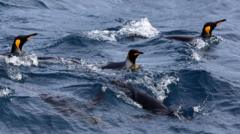The tariffs, aimed at closing loopholes, have raised eyebrows as trade officials insist they are necessary despite minimal trade activity.
US Imposes Controversial Tariffs on Uninhabited Islands Home to Penguins and Seals

US Imposes Controversial Tariffs on Uninhabited Islands Home to Penguins and Seals
US Commerce Secretary defends decision amidst backlash from Australia after stock market plunge.
The US Commerce Secretary, Howard Lutnick, has defended the recent decision to impose tariffs on the uninhabited Heard and McDonald islands, which are home only to penguins and seals. Describing the move as essential to close "ridiculous loopholes" in trade, Lutnick stated that the tariffs would prevent foreign entities from using the islands as a means to circumvent US trade regulations.
Lutnick's remarks came during an interview with CBS, in response to surprise reactions from Australian officials regarding the tariffs, which affect islands situated approximately 4,000 kilometers (2,485 miles) from Australia. Don Farrell, Australia's trade minister, suggested that the imposition of these tariffs was a "clearly a mistake" indicative of a hurried trade process.
When questioned about the rationale behind including Australian territory in the tariff list, Lutnick asserted, "If you leave anything off the list, countries that attempt to exploit that will find ways to go through those countries to reach us." He emphasized that President Trump is committed to rectifying trade loopholes that disadvantage American markets.
The tariffs come amid significant volatility in the US stock market, which saw all three major indexes drop over 5% last Friday, marking the most challenging week for US stocks since 2020. In light of the market's instability, US government officials have been vocal in defending the necessity of the tariffs.
Transshipment, the practice of shipping goods via one port to another, is common in global trade; however, it is often exploited to mask illicit activities. According to Pew Charitable Trusts, this practice has been linked to the illegal movement of hundreds of millions of dollars worth of seafood commodities in the Pacific region annually.
Despite the islands' minimal trade with the US, export data from the World Bank reveals that they exported approximately $1.4 million (A$2.23 million; £1.08 million) in unnamed machinery and electrical products in 2022. The British Indian Ocean territory, which is also included in the tariff list, similarly registered a modest export figure of $414,350 in the same year.
As this situation unfolds, the international community watches closely to see how this unconventional tariff strategy will impact future trade relations.
Lutnick's remarks came during an interview with CBS, in response to surprise reactions from Australian officials regarding the tariffs, which affect islands situated approximately 4,000 kilometers (2,485 miles) from Australia. Don Farrell, Australia's trade minister, suggested that the imposition of these tariffs was a "clearly a mistake" indicative of a hurried trade process.
When questioned about the rationale behind including Australian territory in the tariff list, Lutnick asserted, "If you leave anything off the list, countries that attempt to exploit that will find ways to go through those countries to reach us." He emphasized that President Trump is committed to rectifying trade loopholes that disadvantage American markets.
The tariffs come amid significant volatility in the US stock market, which saw all three major indexes drop over 5% last Friday, marking the most challenging week for US stocks since 2020. In light of the market's instability, US government officials have been vocal in defending the necessity of the tariffs.
Transshipment, the practice of shipping goods via one port to another, is common in global trade; however, it is often exploited to mask illicit activities. According to Pew Charitable Trusts, this practice has been linked to the illegal movement of hundreds of millions of dollars worth of seafood commodities in the Pacific region annually.
Despite the islands' minimal trade with the US, export data from the World Bank reveals that they exported approximately $1.4 million (A$2.23 million; £1.08 million) in unnamed machinery and electrical products in 2022. The British Indian Ocean territory, which is also included in the tariff list, similarly registered a modest export figure of $414,350 in the same year.
As this situation unfolds, the international community watches closely to see how this unconventional tariff strategy will impact future trade relations.




















